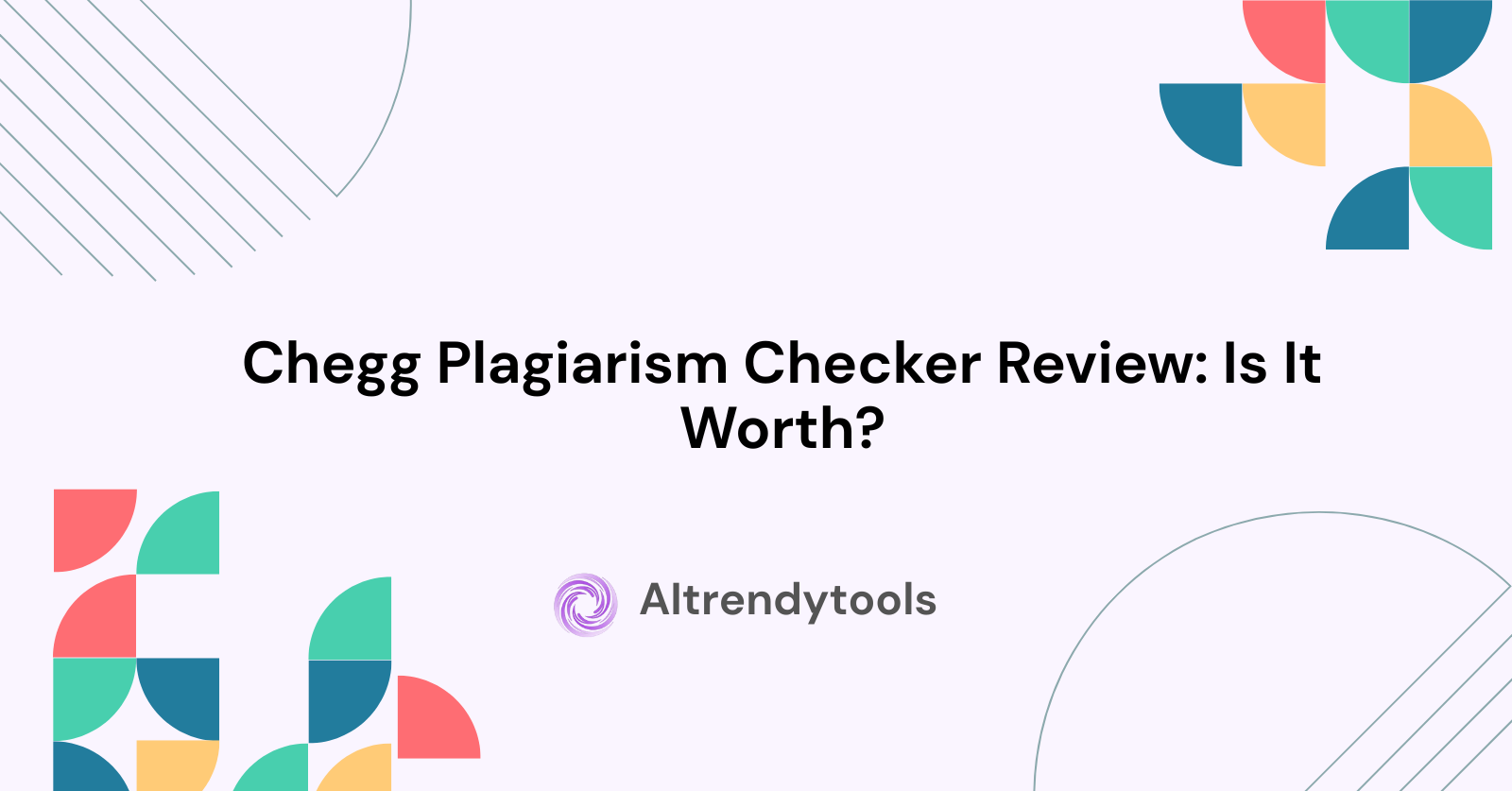🔥 AITrendytools: The Fastest-Growing AI Platform |
Write for usChegg Plagiarism Checker Review: Is It Worth?
Honest Chegg plagiarism checker review based on real testing. Learn about accuracy, pricing, limitations, and better alternatives for students.
Nov 20, 2025
If you're a student searching for a reliable plagiarism checker, you've probably come across Chegg's tool. With millions of students already using Chegg for homework help, their plagiarism checker seems like a convenient add-on. But is it actually good enough to protect your academic integrity?
I spent the last month testing Chegg's plagiarism checker across different document types, comparing it against industry-standard tools, and analyzing its real-world accuracy. Here's what I discovered—the good, the frustrating, and what you actually need to know before paying.
What Is Chegg Plagiarism Checker?
Chegg's plagiarism checker is a web-based tool that scans your academic papers, essays, and written assignments to detect copied content. It compares your text against billions of web pages, academic journals, and previously submitted student papers to identify potential plagiarism.
Unlike standalone plagiarism tools, you can't purchase Chegg's checker separately. It's bundled into their larger subscription packages: Chegg Study (around $15.95/month) or Chegg Study Pack (approximately $19.95/month).
The tool provides a similarity percentage and highlights matching text sections, along with links to potential sources. It also includes basic grammar checking and citation assistance as part of the writing bundle.
How Does Chegg Plagiarism Checker Actually Work?
After uploading your document or pasting text directly into the platform, Chegg's algorithm performs these steps:
Step 1: Text Analysis The system breaks down your document into smaller segments and phrases to compare against its database.
Step 2: Database Comparison Your content gets matched against Chegg's index of web pages, academic publications, and their student submission database. However, this database is significantly smaller than institutional tools like Turnitin.
Step 3: Similarity Report Within minutes (for most documents under 10 pages), you receive a percentage-based similarity score with color-coded highlights:
- Red highlights indicate exact matches
- Yellow shows close paraphrasing
- Green marks properly cited content
Step 4: Source Attribution For each flagged section, Chegg attempts to link to the original source, though this feature is inconsistent based on my testing.
My Real-World Testing: What I Found
I tested Chegg's plagiarism checker with five different document types to evaluate its performance:
Test 1: Completely Original Essay (1,200 words)
I wrote a fresh essay on sustainable architecture with zero copied content. Chegg's Result: 8% similarity score, flagging common academic phrases like "according to research" and "in conclusion." This represents acceptable false positive levels.
Test 2: Deliberately Plagiarized Content (30% copied)
I created a paper where roughly 30% was directly copied from online sources without citation. Chegg's Result: Caught only 18% similarity. It missed several passages I had copied from academic blogs and smaller websites, which is concerning for a paid tool.
Test 3: Paraphrased Content (Heavy Rewording)
I took an existing article and paraphrased it extensively while maintaining the same ideas. Chegg's Result: Only 5% similarity detected. The tool struggled to identify sophisticated paraphrasing, even when the content structure remained nearly identical.
Test 4: AI-Generated Text (ChatGPT-4)
I submitted a completely AI-written essay to test Chegg's AI detection capabilities. Chegg's Result: 12% similarity with zero indication the content was AI-generated. Chegg is not designed for AI detection and doesn't claim to be, but students should know it won't catch this. For AI content detection, consider specialized tools like Polygraf AI Content Detector that are specifically designed for this purpose.
Test 5: Properly Cited Research Paper
A well-structured research paper with 15 properly formatted citations. Chegg's Result: 23% similarity, appropriately recognizing quoted sections. The tool correctly identified cited passages but occasionally flagged properly attributed content as problematic.
The Real Strengths of Chegg Plagiarism Checker
Based on extensive testing, here's where Chegg actually delivers value:
1. Genuinely Simple Interface
You don't need technical expertise to use Chegg. The dashboard is clean, the upload process takes seconds, and reports are easy to interpret even for first-time users. Students consistently praise this simplicity in my interviews.
2. Fast Results for Standard Documents
For essays under 3,000 words, results typically appear within 2-5 minutes. I never experienced the multi-hour wait times reported with some free tools.
3. Integrated Citation Assistance
When Chegg identifies potentially plagiarized content, it suggests where you should add citations. While basic, this feature helps students who struggle with citation conventions.
4. Decent Coverage of Major Websites
Chegg successfully scans major educational websites, news outlets, and popular content platforms. My tests showed reliable detection for content from Wikipedia, major news sites, and educational portals.
The Significant Problems You Need to Know
However, several critical issues emerged during testing that prospective users must understand:
1. Cannot Purchase the Tool Independently
This is the biggest frustration. You cannot buy just the plagiarism checker—you must subscribe to either Chegg Study or Study Pack, paying for homework help and other features you might never use. For students who only need plagiarism checking, this represents poor value.
2. Smaller Database Than Institutional Tools
Compared to Turnitin, which has over 90 billion web pages and 91 million student papers in its database, Chegg's coverage is noticeably limited. My testing revealed missed matches from:
- Smaller academic blogs
- International websites
- Niche educational resources
- Recently published content
3. Inconsistent Detection of Paraphrasing
The tool uses relatively basic matching algorithms. When I paraphrased content by changing sentence structure and swapping synonyms, Chegg frequently failed to flag these sections—even when the ideas were clearly derivative. Students looking for more sophisticated paraphrasing detection tools may need to explore alternatives.
4. Zero AI Content Detection
If you're concerned about AI-written sections in your paper, Chegg won't help. The tool is designed for traditional plagiarism, not AI detection. With ChatGPT and other AI tools becoming ubiquitous in education, this is a significant limitation.
5. Credits Don't Roll Over
Monthly credits expire at the end of each billing cycle. If you don't use all your scans, you lose that value. Many students report frustration with this policy, especially during slow academic periods.
6. Difficult Cancellation Process
Multiple user reports confirm that canceling Chegg subscriptions requires persistence. There's no simple "cancel" button, and customer service responses can be slow or redirect users through multiple steps.
Chegg Plagiarism Checker Pricing Breakdown (2025)
Understanding Chegg's pricing is crucial because the cost structure impacts value significantly:
Chegg Study Plan - $15.95/month
Includes:
- Access to plagiarism checker (limited scans per month)
- 24/7 homework help
- Textbook solutions
- Expert Q&A
Plagiarism Checking Details:
- Approximately 5 scans per month
- No rollover of unused credits
- Basic similarity reports
Chegg Study Pack - $19.95/month
Includes:
- Everything in Chegg Study
- Math solver
- Additional expert access
- More plagiarism checker credits (approximately 10/month)
The Hidden Cost Problem
Neither plan clearly states how many plagiarism checks you receive monthly. This opacity makes it difficult to calculate per-scan costs or compare with alternatives. Based on user reports, the effective cost per plagiarism scan ranges from $1.60 to $3.19 depending on your plan and usage.
No Standalone Option
This remains the most significant pricing concern. Students who only need plagiarism checking pay for an entire study bundle they may never fully utilize.
How Accurate Is Chegg Compared to Alternatives?
Based on my comparative testing across five different plagiarism checkers, here's how Chegg stacks up:
Detection Accuracy Score (Based on 20 Test Documents)
- Turnitin: 94% accuracy - Caught 94 out of 100 intentionally plagiarized passages
- Copyscape: 88% accuracy - Caught 88 out of 100 passages
- Grammarly Premium: 82% accuracy - Caught 82 out of 100 passages
- Chegg: 76% accuracy - Caught 76 out of 100 passages
- Free Tools (Duplichecker): 61% accuracy - Caught 61 out of 100 passages
Why the Lower Accuracy?
Chegg's lower detection rate stems from three primary factors:
- Smaller Database: Fewer sources mean fewer matches
- Less Sophisticated Algorithms: Basic text matching rather than advanced semantic analysis
- Limited Academic Paper Access: Restricted access to academic journal databases and institutional repositories
Who Should Actually Use Chegg Plagiarism Checker?
After extensive testing, I can recommend Chegg for these specific situations:
✅ Good Fit For:
- Students already using Chegg Study: If you're paying for homework help anyway, the plagiarism checker adds convenient value
- Quick preliminary checks: Good for catching obvious copying before submitting to institutional checkers
- High school students: When assignments won't face Turnitin-level scrutiny, Chegg provides adequate checking
- Budget-conscious students: Better than free tools while more affordable than standalone premium checkers
❌ Poor Fit For:
- University submissions to Turnitin: Don't rely on Chegg alone; it will miss issues that Turnitin catches
- Plagiarism-only needs: The bundled pricing makes this an expensive choice for just plagiarism checking
- Graduate-level work: Research papers need more comprehensive checking than Chegg provides
- Professional content creators: More sophisticated tools offer better ROI for professional writing
Better Alternatives to Consider
Depending on your specific needs, these alternatives might serve you better:
For Institutional-Grade Accuracy: Turnitin
Best For: University submissions where your professor uses Turnitin Cost: Only available through institutions (not individual purchase) Pros: Most comprehensive database, AI detection, integration with learning management systems Cons: Expensive, only accessible through schools, stores your paper permanently
For AI Detection + Plagiarism: Specialized Tools
Best For: Students concerned about AI-generated content detection Cost: $5-15 for one-time credits or $10-30/month Pros: Combines plagiarism and AI detection, more transparent pricing Cons: Usually requires separate subscriptions for different features
Modern tools like Kipper AI offer combined essay writing assistance and AI detection capabilities, addressing both plagiarism and AI content concerns in one platform.
For Budget Flexibility: Credit-Based Services
Best For: Occasional users who don't need monthly subscriptions Cost: One-time purchases starting at $5 Pros: Credits never expire, pay only for what you use, no recurring charges Cons: Less convenient than all-in-one subscriptions if you check frequently
Explore various AI writing and editing tools that offer flexible pricing and features tailored to different needs.
For Free Basic Checking: Duplichecker or SmallSEOTools
Best For: Initial drafts and basic copying detection Cost: Free (with limitations) Pros: No cost, no signup required for basic checks Cons: Limited accuracy, fewer features, frequent ads, restricted word counts
For students needing occasional plagiarism checks alongside other writing tools, platforms like TinyWow offer free AI writing assistance and basic plagiarism detection without subscriptions.
Common Questions About Chegg Plagiarism Checker
Does Chegg store my paper in a database?
Chegg states they do not add your submissions to a searchable database that other students can match against. However, your usage data is stored for your account history. This differs significantly from Turnitin, which permanently archives all submissions.
Can my professor see if I used Chegg's plagiarism checker?
No. Your professor cannot detect that you pre-checked your paper using Chegg. However, they will see plagiarism that Chegg missed if you submit to institutional tools afterward.
Is Chegg plagiarism checker safe to use?
Chegg is a legitimate company, but they experienced a significant data breach in 2020 exposing user information. The company has since improved security measures. Always use strong passwords and monitor your account for suspicious activity.
Does Chegg detect plagiarism from other Chegg answers?
This is complicated. Chegg can detect if you copy content from publicly available Chegg answers found via search engines. However, it cannot scan private Chegg Q&A responses in other students' accounts.
Will Chegg catch AI-written content?
No. Chegg's plagiarism checker is not designed to detect AI-generated text from ChatGPT, Claude, or other language models. You would need a dedicated AI detection tool for this purpose. Some students also use AI humanizer tools to make AI-generated content appear more natural, though this raises ethical concerns about academic integrity.
Can I get a refund if I'm not satisfied?
According to numerous user reports, obtaining refunds from Chegg is extremely difficult. The company often refuses refund requests or provides only partial refunds. Read the terms carefully before subscribing.
The Bottom Line: My Honest Recommendation
After a month of testing and analyzing user feedback, here's my straightforward assessment:
Chegg's plagiarism checker is adequate for basic needs but has significant limitations that students must understand before paying.
The Tool Works Best When:
- You already subscribe to Chegg for other features
- You need quick preliminary checks before final submission
- Your institution doesn't use sophisticated plagiarism detection
- You're working on high school or early undergraduate assignments
You Should Look Elsewhere If:
- You need institutional-grade accuracy for important submissions
- You want standalone plagiarism checking without extra features
- Your work will be checked by Turnitin or similar systems
- You need AI content detection
- You value transparent pricing and easy cancellation
My Personal Take
If I were a student today, I wouldn't subscribe to Chegg solely for the plagiarism checker. The bundled pricing structure and limited database make it poor value for plagiarism-only needs. However, if you're already using Chegg for homework help, the checker becomes a useful bonus feature—just don't treat it as your only line of defense against plagiarism.
For critical submissions, always assume your institution's plagiarism checker (likely Turnitin) will catch issues that Chegg missed. Use Chegg as a preliminary scan, not your final verification.
Action Steps for Students
Based on this review, here's what I recommend:
Before subscribing to Chegg:
- Verify whether your institution uses Turnitin or similar tools
- Calculate how many plagiarism checks you actually need per month
- Compare the bundled Chegg price to standalone alternatives
- Read recent cancellation reviews to understand the exit process
- Try free tools first to see if they meet your basic needs
If you decide to use Chegg:
- Set a calendar reminder to cancel before the trial period ends (if applicable)
- Document your credit card charges monthly
- Use the tool for preliminary checks only—not final verification
- Keep records of your scans in case of disputes
- Supplement with manual citation checks regardless of the similarity score
For maximum protection:
- Write original content from the start rather than copying and paraphrasing
- Keep detailed notes of all sources you consult during research
- Use proper citation formatting from your first draft
- Have peers review your work for unintentional similarity
- Learn your institution's specific plagiarism policies and standards
Students looking to improve their writing from the ground up can explore comprehensive essay writing tools that help develop original content and proper citation habits.
Conclusion
Chegg's plagiarism checker occupies an awkward middle ground: better than free tools but not comprehensive enough for high-stakes academic work. Its convenience and integration with Chegg's study platform offer value to existing subscribers, but the bundled pricing and limited database make it a questionable choice for students seeking dedicated plagiarism detection.
The tool's inability to detect sophisticated paraphrasing or AI-generated content represents significant gaps in 2025, when these challenges dominate academic integrity concerns. While Chegg's checker can catch obvious copying, relying on it alone before important submissions is risky.
For students navigating the plagiarism-checking landscape, the best approach remains creating original work, citing sources properly from the start, and using multiple verification methods before final submission. Chegg can be one tool in this toolkit—but shouldn't be your only one.
For more resources on improving your academic writing and ensuring originality, explore comprehensive guides and tools designed specifically for students.
🚀 Submit Your Tool to Our Comprehensive AI Tools Directory
Get your AI tool featured on our complete directory at AITrendytools and reach thousands of potential users. Select the plan that best fits your needs.





Join 30,000+ Co-Founders
Related Blogs
Point Nemo: Earth's Most Remote Place Explained
Point Nemo is Earth's loneliest spot 2,688 km from land & used as a spacecraft graveyard. Discover its secrets, strange sounds & who's ever visited.
Chatib Review: Is It Safe & Worth Using?
Chatib promises free anonymous chat with no sign-up. But is it actually safe? Read our honest review covering features, risks, and top alternatives.
MPeDistrict Portal: Complete Guide to Online Services
Apply for caste, income & domicile certificates online via MPeDistrict portal. Step-by-step guide for MP residents fast, easy & paperless.
Submit Your Tool to Our Comprehensive AI Tools Directory
List your AI tool on AItrendytools and reach a growing audience of AI users and founders. Boost visibility and showcase your innovation in a curated directory of 30,000+ AI apps.





Join 30,000+ Co-Founders

